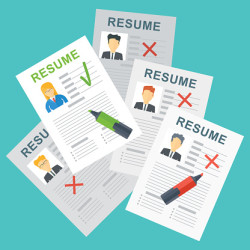8 Common Pitfalls on Resumes
Highlighting your abilities on a resume is difficult. The pressure to impress potential employers can easily distract the writer from correcting harmful mistakes and errors.
At Reynolds and Reynolds, our recruiting department looks over every resume submitted. They identify the applicant’s strengths, weaknesses, and identify departments where the individual may thrive. The recruiting department shared the following list of common pitfalls they see on resumes:
1. Too Much Personal Information
Your resume isn’t an autobiography, so be careful not to include too much personal information. Your birth date, age, hobbies, anecdotes, etc. are a few things that can be asked in the interview if needed. The only personal information you should include is your name, and how you can be contacted.
2. Spelling Errors
Our recruiting department sees misspelled words more often than you think. Take time to triple-check your resume, and have someone proofread your work before it’s submitted.
3. Reasons for Leaving Past Employers
Typically, this information would go on an application. On your resume, we want to hear about why you would be a great fit. List your previous job experience, and keep things short and sweet.
4. Inconsistent Format
Your format for both information and the resume layout should be consistent. Keep your information in chronological order, and have the same pattern of bolded text, type size, and text alignment throughout the resume to help the reader focus on what you bring to the table.
5. Multiple Pages
Unless you are a professional in your field with extensive experience, one page is all you need. In a career fair setting, multiple pages may get lost or misplaced, leaving incomplete or mismatched information. If your resume goes over one page, try to cut it back.
6. Incorrect Information
If you personalize your resume to the job position or company, stay up-to-date. Sending a resume with the wrong company name or position title isn’t ideal.
7. Irrelevant Information
Having certifications is wonderful and something to be proud of, but you may not want to include them if they aren’t relevant to your desired career. Only include relevant job-specific certifications and attributes.
8. Repetition
It can be easy to get stuck using the same words while trying to sound professional, but attempt to change the way you start sentences, paragraphs, etc. to help make processing the information easier on the reader.
By keeping your resume relevant and professional, you will be well on your way to impressing the recruiters and getting a call to interview for your dream job. If you are looking for a little more advice on resume writing, check out our article on Resume Writing Basics.

















